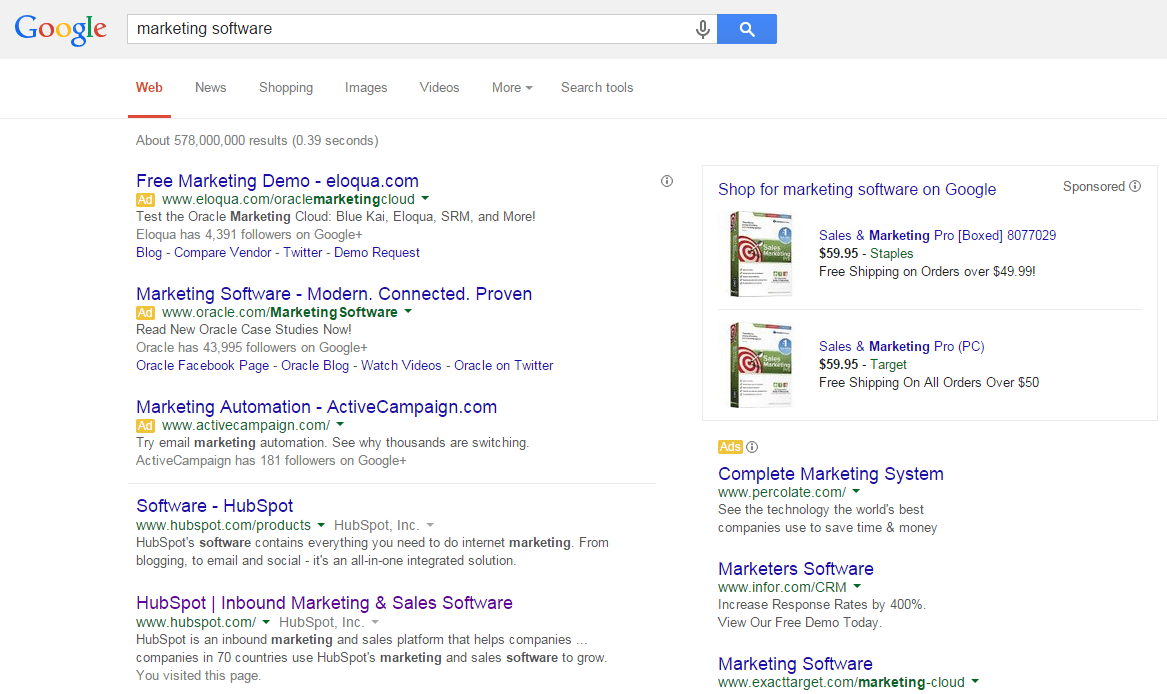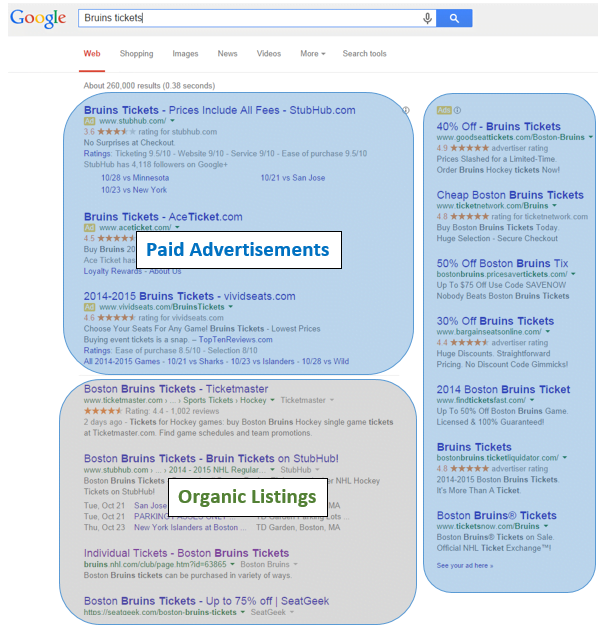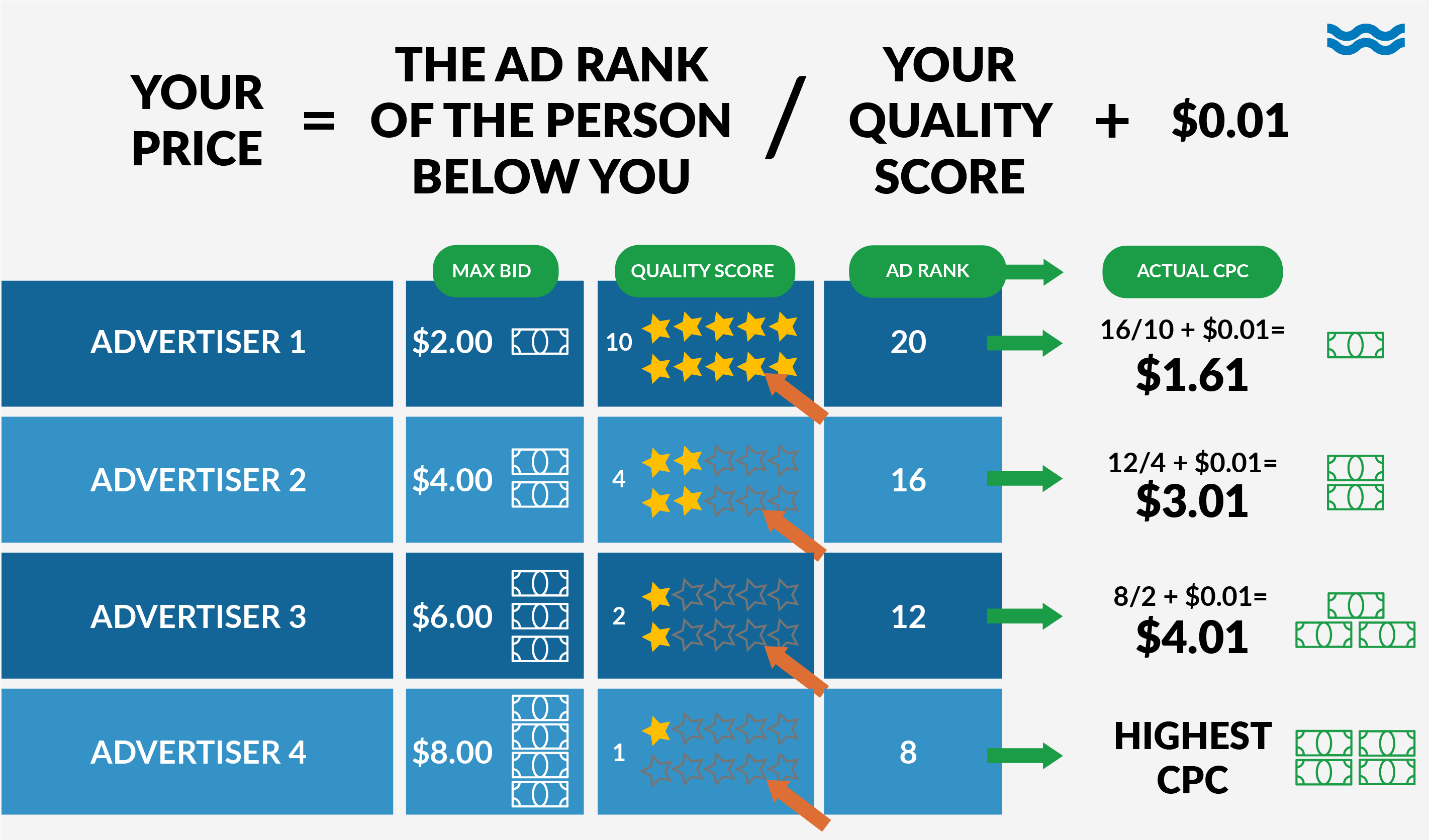What Is Search Marketing? Beginner’s Guide to Marketing Through Search
Search marketing is a tactic used to gain online presence and traffic via paid and unpaid strategies on search engines such as Google, Bing, and Yahoo.
Visualize the last time you searched for something using a search engine. The text you typed into that small search box is called your “search query,” which then directs you to a page similar to the image below. This page is known as a SERP, or Search Engine Results Page. The higher you rank on the SERPs, the more traffic you’ll get to your website. But the question is: How does Google determine who gets these top placements?
This is where search marketing comes into play.

Search marketing is divided into two main categories:
- SEO (Search Engine Optimization): The process of gaining search engine rankings via organic, unpaid tactics, such as content marketing.
- PPC (pay-per-click or paid advertising): The process of placing listings in search engines via paid advertisements.
Why Is Search Marketing Important?
The answer is simple. Every day millions upon millions of people hop on the internet to search, whether that be for a new restaurant, a problem they’re trying to solve, or a product they’re looking to purchase. Wouldn’t you like your business to appear in the search results to provide them with the solution they’re searching for? This is why search marketing is a critical strategy for all businesses who want to gain and grow their companies.
Now that we know search marketing is critical for business growth, let’s dive the two tactics that can improve your presence on search engines.
SEO (Search Engine Optimization) or Organic Search Marketing
SEO is the process of growing your web presence via unpaid efforts. The unpaid links that appear in the search engine results are known as organic results, which are generally found below the paid search ads. See the image below – the organic results are the ones found in the green box below the top paid placements highlighted in blue.

Search engines like Google find organic listings by crawling the internet with spiders that review the text on your website, PDFs, documents, and other content. Google also considers the data in your website’s source code (called meta tags), and many other quality signals, such as site speed and how many other sites are linking directly to your website. For Google, the goal is always to provide the best results possible, so if people aren’t clicking on your site from the SERP or if they have a bad experience once they get there, this can lower your rankings.
How do I increase my chances of getting listed organically on Google?
This is where SEO comes into play. There are several things you can do such as improve your chances of being ranked organically, such as optimizing your content to include relevant keywords, creating unique, valuable, high-quality content to build authority and links, and maintaining an active presence on social media to help grow an audience.
How strong is your SEO? Get a free SEO audit with the LOCALiQ website grader!
When will I see results?
With SEO, results can take time. Not to mention you’re up against competitors who are also working for the same rankings. It’s still worth your investment to do SEO, but when you need results fast, paid search marketing might be your answer.
PPC (Pay-Per Click) or Paid Search Marketing
Paid search marketing can give you faster results than SEO, as well as a much higher level of control when it comes to your placement in the search results. Most businesses and websites will get the best results from a mix of paid and unpaid search marketing tactics.
How does paid search marketing work?
With paid search, advertisers tell Google exactly which search terms they want their ads to show for. When someone clicks on one of your paid search ads, you pay a set cost to the search engine (hence, pay per click). The amount you pay is called your cost per click (CPC).

Your CPC is determined by several factors, including your max CPC (which you control), your Quality Score (a measure of how relevant your ads and landing pages are to the keywords you’re bidding on), and the competition level for your keywords. Every time someone searches for a keyword you’re bidding on, you enter a real-time auction that determines both your ad rankings and your actual cost per click. Learn more about how the Google Ads auction works here.
How do I get started with paid search marketing?
Before setting up and running a paid search marketing campaign, it’s critical to comprehend the ins and outs of paid search. Luckily, we’ve created PPC University, a free learning resource to guide you through the world of PPC.
Already have a paid search marketing campaign set up and running? Find out how it’s really performing and how you can improve with our free Google Ads Grader!
